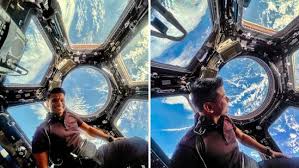Shubhanshu Shukla to spend a few more days on ISS, return expected not before July 14

Indian astronaut Shubhanshu Shukla will spend more time on the International Space Station (ISS) than originally planned. His return to Earth is now expected no earlier than July 14. This change in schedule has sparked public interest and raised discussions about the dynamic nature of space missions.
Why the Extension?
Shukla’s extended stay isn’t due to emergencies or technical failures. Instead, it reflects the flexibility required in spaceflight planning. Space missions often involve changes because of crew rotation schedules, weather conditions, or scientific goals.
In this case, the extended timeline will allow Shukla to continue participating in critical scientific experiments. These studies benefit from longer observation periods in microgravity. His extended presence also helps with ongoing crew coordination tasks on the ISS.
Scientific Work Continues in Orbit
The ISS serves as a unique lab in space. Here, astronauts work on cutting-edge research in fields like biology, physics, and materials science. Shukla’s time in orbit is focused on human health studies, including how space affects the body over time.
He is also contributing to experiments that examine fluid dynamics, plant growth, and advanced materials. These projects aim to improve life on Earth while preparing for long-term missions to the Moon and Mars.
India’s Growing Role in Space Exploration
Shukla’s mission highlights India’s rising position in global space collaboration. Though the ISS is mainly a joint project of NASA, Roscosmos, ESA, JAXA, and CSA, India’s increasing involvement in international missions signals its growing influence.
By contributing both talent and technology, India is showing it can play a key role in future missions beyond Earth orbit. Shukla is also representing the potential of Indian astronauts in global space science.
You can explore India’s space journey further on the ISRO official website.
The Human Side of Space Travel
Living in space challenges both the body and mind. Astronauts face muscle loss, changes in bone density, and other health issues due to microgravity. For this reason, Shukla follows a strict routine of daily exercise, medical checkups, and psychological support.
Doctors and scientists on Earth are tracking his health in real time. These efforts help ensure his safety and gather data for future missions. The longer Shukla stays on the ISS, the more useful this data becomes.
By adjusting the mission timeline, the space agencies involved are prioritizing both safety and scientific value.
International Collaboration at Its Best
Shukla is working with astronauts from various countries. They come from different backgrounds but share a common goal: advancing science and preparing for future exploration.
Such cooperation shows how space can bring nations together. It also allows for shared resources, combined research goals, and faster innovation.
For example, new technologies tested on the ISS might soon help in solving problems on Earth—like improving water purification systems or advancing telemedicine.
You can follow global ISS updates on the NASA website.
The Benefits of a Few Extra Days
Although the extension may seem minor, a few more days in orbit can produce major benefits. Longer missions help astronauts adapt to space life and collect more accurate data.
Shukla’s mission supports research that is vital for long-term human presence in space. The data gathered during his stay will help design better spacecraft, health systems, and life-support technologies.
His time on the ISS is also inspiring future scientists, especially in India. Young students are watching his journey closely, many of them dreaming of becoming astronauts themselves.
What’s Next?
As of now, Shukla’s return is planned for sometime after July 14. Officials will confirm the exact date based on spacecraft availability and mission readiness. Until then, he will continue his research tasks and maintain his physical health.
Space agencies will carefully manage the return process to ensure everything goes smoothly. Once Shukla is back on Earth, he will go through medical evaluation and post-mission training to help him readjust to gravity.
Conclusion
Shubhanshu Shukla’s extended stay on the ISS is not just a schedule shift. It represents a valuable scientific opportunity, a moment of national pride, and a step forward in space exploration.
His time in orbit highlights how modern space missions require flexibility, international teamwork, and a strong focus on research. With each orbit around Earth, Shukla contributes to our understanding of space—and what it means for the future of humanity.






